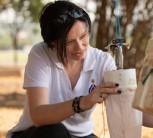Malaria transmission in South Africa is seasonal and the months of September to May are malaria- or high season months. The summer rains during the first quarter of the year brings with them an increase in the number of malaria cases and malaria transmission is at its highest during the warmer and wetter months of November through to April with a peak in January and February. Towards May, a decrease in malaria cases occur due to less favourable environmental conditions for the mosquitoes, and the risk of contracting malaria between June and end August (low season a.k.a. winter) are lower. Importantly LOW risk does not mean NO risk.
An increase in the number of malaria cases has been noted in the low season of 2017 when compared to the low season in 2016. Between June and August 2016 there were 794 cases versus 2238 cases over that same period in 2017. The amount of rainfall impacts on the number of cases, with higher rainfall allowing for an increase in case numbers. This, along with the warmer temperatures experienced during that time, could potentially be the reason for the increase in the number of cases in the winter of 2017. A change in the climate, such as the temperature and rainfall patterns could be creating the perfect conditions for mosquitoes to continue breeding, even in the supposedly colder months.
Malaria is a parasitic disease which is transmitted by mosquito vectors of the Anopheles genus. In South Africa the malaria risk or endemic areas are the north-eastern parts of Limpopo Province with the higher risk closer to the Limpopo River Valley, lowveld areas of Mpumalanga Province including the Kruger National Park (KNP) and the far north parts of KwaZulu-Natal Province bordering Mozambique. Residents and travellers/tourists to malaria-risk areas, including holiday destinations such as the KNP and Mozambique, must remain vigilant regarding malaria and make use of anti-mosquito measures to avoid being bitten. The use of malaria chemoprophylactic drugs are advised.
Commonly misdiagnosed as flu, which is more common during winter time, malaria presents itself as bouts of fever accompanied by cold or flu-like symptoms, alternating with periods of absence of feeling sick. Intermittent symptoms include headache, malaise, fatigue, nausea, muscular pains, chills and even diarrhoea. People in endemic areas or those who have recently visited such an area should consult a physician or healthcare practitioner immediately when these symptoms appear. Malaria treatment is highly effective if administered during the early stages of the disease. Symptoms of complicated or severe malaria can develop quickly and include delirium, generalised convulsions, impaired consciousness and respiratory distress.
Malaria awareness of the disease and the risks associated with it, especially in high risk areas, is the first step towards prevention. People need to be made aware of the disease in order to protect themselves, even if they do not live in an endemic area. Prevention is better than cure and when living in or traveling to a malaria area consider the following to avoid being bitten (also useful for non-malaria mosquitoes): Avoid going out between dusk and dawn when Anopheles mosquitoes usually feed; wear long-sleeved clothing if going out at night; avoid wearing dark colours because they attract mosquitoes; apply DEET-containing insect repellent to exposed skin; use screens over windows and doors; use anti-mosquito sprays or insecticide dispensers, or burn mosquito coils at night and; sleep under bed nets if available.
Researchers at the University of Pretoria Institute for Sustainable Malaria Control (UP ISMC) do research on malaria vectors (mosquitoes), malaria parasites and human health. They have a trans-disciplinary approach towards malaria control and eventual elimination, with a strong focus on new innovations for malaria prevention. The UP ISMC released a mobile app, ‘Malaria Buddy’, in collaboration with Travel with Flair (TWF). The app is continuously being updated with the aim to make the app an all-encompassing malaria information tool. The app is available to download on the iTunes store for iOS devices and Google play for Android devices. More information on malaria is available on the Frequently Asked Questions page (FAQs) of the UP ISMC website (www.malaria.up.ac.za).
Dr Taneshka Kruger
May 8, 2018

 Story
Story
This edition is curated around the concept of One Health, in which the University of Pretoria plays a leading role globally, and is based on our research expertise in the various disciplines across healthcare for people, the environment and animals.
 Story
Story
Paediatric neurosurgeon Professor Llewellyn Padayachy, Head of the Department of Neurosurgery at the University of Pretoria’s (UP) Steve Biko Academic Hospital, is redefining how brain-related diseases are diagnosed and treated, especially in low-resource settings. He’s at the forefront of pioneering work in non-invasive techniques to assess and measure raised pressure inside the skull,...
 Infographic
Infographic
Africa faces immense challenges in neurosurgery, such as severe underfunding, a lack of training positions and a high burden of disease. There is one neurosurgeon per four million people, far below the WHO’s recommendation of one per 200 000. This shortage, compounded by the lack of a central brain tumour registry and limited access to diagnostics, severely impacts patient outcomes.
Copyright © University of Pretoria 2025. All rights reserved.
Get Social With Us
Download the UP Mobile App